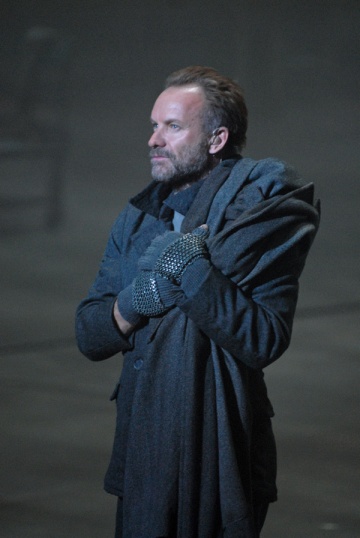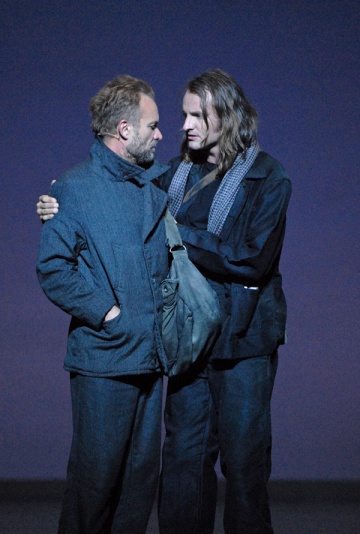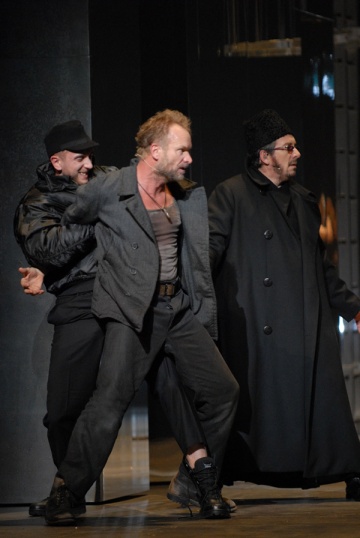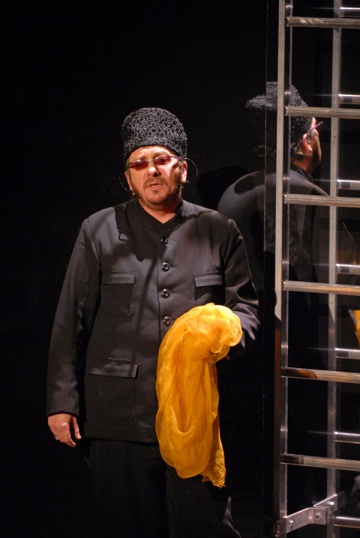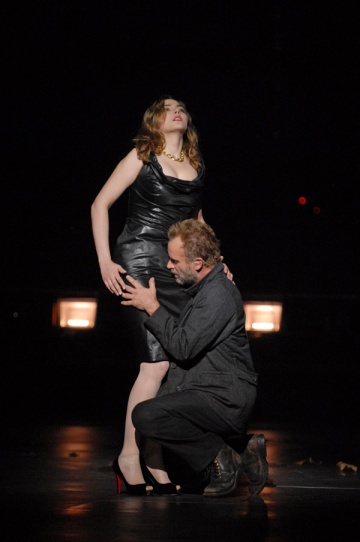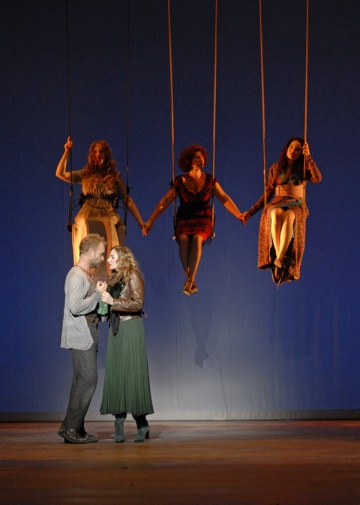Opera Now, November 21, 2008: Difference between revisions
(create page for Opera Now review of Concert 2008-11-20 Paris) |
m (add hyperlink for Barbara Bonney) |
||
| Line 29: | Line 29: | ||
Dressed in shabby, muted greys – almost tramp-like – Dionysos is very much a Brechtian figure whose journey of discovery leads us to the understanding of a lesson – in this case, the appreciation of the human voice. The music too is reminiscent of [[Kurt Weill|Weill]] (indeed Weill is listed as one of Dionysos’ composer heroes – a clue perhaps to Nieve’s influences). The libretto is rich and flowing pretty much most of the time, falling only occasionally into the slightly preaching, but not enough to detract from the impact of the opera’s message. | Dressed in shabby, muted greys – almost tramp-like – Dionysos is very much a Brechtian figure whose journey of discovery leads us to the understanding of a lesson – in this case, the appreciation of the human voice. The music too is reminiscent of [[Kurt Weill|Weill]] (indeed Weill is listed as one of Dionysos’ composer heroes – a clue perhaps to Nieve’s influences). The libretto is rich and flowing pretty much most of the time, falling only occasionally into the slightly preaching, but not enough to detract from the impact of the opera’s message. | ||
The juxtaposition of the pop voices of Sting and Costello with the classical voices of the opera singers was intentional as a means of underlining the different types of beauty the human voice can possess. The piece was written with these artists in mind and had already been recorded in 2007 – with Barbara Bonney as the opera singer. Sting himself opted for a slightly more musical theatre voice than we are accustomed to hearing from him, but was nonetheless consistantly true to the idiosyncracies of his own voice. Costello seemed to struggle slightly more with the leaps and range demanded of him, but again we are familiar with his sound and Nieve wrote sensitively for him, allowing the pathos that is inherent in Costello’s voice to come out. It was very effective to have two such unique and instantly recognisable voices placed against the more general, flowing beauty of the opera singers. And all four opera singers were outstanding. The Ghosts – [[Marie-Ange Todorovitch|Marie-Ange Todorovich]] as Carmen, [[Sonya Yoncheva]] as Butterfly and Anna Gabier as Norma – fulfilled their roles to the max, both physically and vocally. But the crowning glory had to be [[Sylvia Schwartz]] as Lily, the Opera Singer. In a most beautiful piece of writing for the voice, her declaration of love for Dionysos displayed the entire range of her sensitive, spun tone. | The juxtaposition of the pop voices of Sting and Costello with the classical voices of the opera singers was intentional as a means of underlining the different types of beauty the human voice can possess. The piece was written with these artists in mind and had already been recorded in 2007 – with [[Barbara Bonney]] as the opera singer. Sting himself opted for a slightly more musical theatre voice than we are accustomed to hearing from him, but was nonetheless consistantly true to the idiosyncracies of his own voice. Costello seemed to struggle slightly more with the leaps and range demanded of him, but again we are familiar with his sound and Nieve wrote sensitively for him, allowing the pathos that is inherent in Costello’s voice to come out. It was very effective to have two such unique and instantly recognisable voices placed against the more general, flowing beauty of the opera singers. And all four opera singers were outstanding. The Ghosts – [[Marie-Ange Todorovitch|Marie-Ange Todorovich]] as Carmen, [[Sonya Yoncheva]] as Butterfly and Anna Gabier as Norma – fulfilled their roles to the max, both physically and vocally. But the crowning glory had to be [[Sylvia Schwartz]] as Lily, the Opera Singer. In a most beautiful piece of writing for the voice, her declaration of love for Dionysos displayed the entire range of her sensitive, spun tone. | ||
In all, Nieve should be congratulated for his ability to display the full beauty of the voices he is writing for – a rare gift these days – and one which gives meaning to the whole argument of the opera. Little wonder that there was a spontaneous standing ovation at the end. | In all, Nieve should be congratulated for his ability to display the full beauty of the voices he is writing for – a rare gift these days – and one which gives meaning to the whole argument of the opera. Little wonder that there was a spontaneous standing ovation at the end. | ||
Revision as of 12:58, 24 August 2014
|
